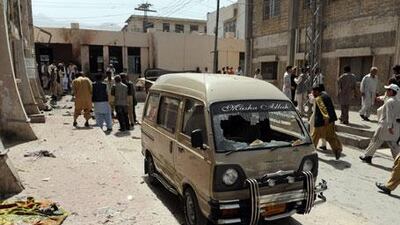QUETTA, PAKISTAN // A suicide bomber attacked a hospital emergency room where Shiites were mourning the death of a bank manager today, killing eight people including a journalist and two policemen in Pakistan's main south-west city, police said. The explosion in Quetta underscored the poor security conditions in Pakistan, a US ally where sectarian violence remains a problem even as al Qa'eda and Taliban militants pose a growing - and linked - threat.
It wasn't the first time that Shiite mourners have been attacked at hospitals in Pakistan, evidence of a tactic in vogue for their Sunni extremist foes. Gunshots rang out after the explosion at the Civil Hospital, and rescuers carried away the dead and wounded, TV footage showed. Among the dead was a cameraman working for Pakistan's Samaa TV, said Saifuddin Khan, a hospital official. Two policemen also died, while 35 people were wounded in the apparent "sectarian attack," said Qazi Abdul Wahid, a senior police investigator. Journalists were at the hospital covering the aftermath of Friday morning's shooting of the bank manager, who came from a prominent Shiite family.
A gunman shot him as he stepped out of his car outside the bank on a major city road, officials said. The emergency room was full of his friends and relatives when the bomber struck at the gate, police official Mohammad Sabir said. Quetta is the capital of Baluchistan province, and it is believed to be a major centre for the leadership of the Afghan Taliban. However, the violence that occurs in Baluchistan has been blamed on Baluch separatist groups or tensions between Sunnis and Shiites.
In February, suspected Sunni militants bombed a bus carrying Shiite worshippers and two hours later attacked a hospital treating the victims, killing 25 people and wounding 100 in the southern Pakistani city of Karachi. And in August 2008, a suicide blast outside the emergency ward of a hospital crowded with Shiite mourners in the volatile north-west town of Dera Ismail Khan killed at least 27 people, including two police.
Suspected Sunni extremists also have attacked funeral processions of Shiite mourners. Extremist Sunnis and Shiites in Pakistan have targeted each other's leaders in violence that dates well before the 2001 terrorist attacks in the United States. But several of Pakistan's Sunni extremist groups also are allied with the Taliban and al Qa'eda, who view Shiites as infidels. * AP

